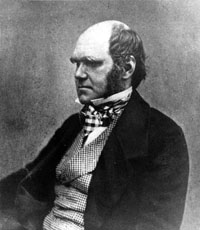
Darwin developed an interest in natural history while studying medicine and theology at Edinburgh and Cambridge Universities. Darwin's observations on his five-year voyage on the Beagle (1831-1836) brought him eminence as a geologist and fame as a popular author. His biological observations and collections helped him formulate ideas on the transmutation of species and in 1838 he conceived his theory of natural selection. Concerned about scientific rejection, he confided his ideas only in his closest friends and continued his research to meet anticipated objections. However, in 1858 the news that Alfred Russel Wallace had independently developed a similar theory forced an early joint presentation of the theory by the two scientists at the Linnean Society of London.
His 1859 book On the Origin of Species by Means of Natural Selection, or The Preservation of Favored Races in the Struggle for Life (usually abbreviated to The Origin of Species) established evolution by common descent as the dominant scientific explanation of how diversification of organisms occurs in nature. This explanation was bolstered by considerable evidence that species originated through evolutionary change, at the same time proposing the scientific theory that natural selection is the mechanism by which such change occurs.